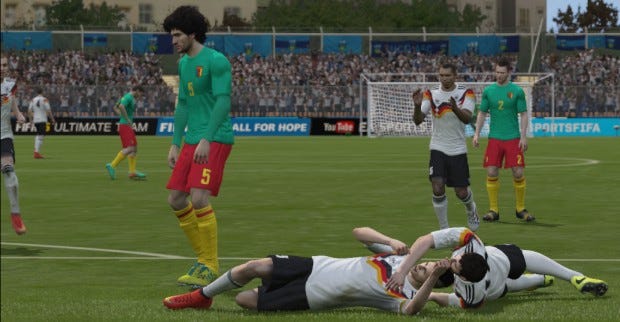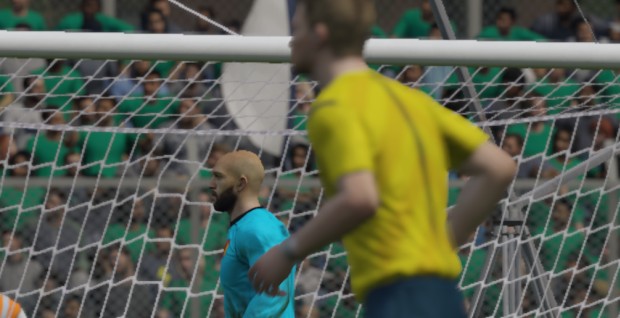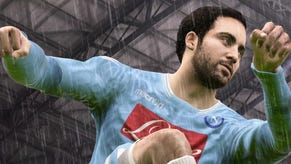Wot I Think: FIFA 15
Muddled Thoughts
FIFA is a game you play co-operatively with your computer.
This is true of any game, of course; there is no play without the computer's reaction to your inputs. But FIFA requires that you steer eleven footballers in real-time around a pitch you can see less than a third of at any given moment. To make that possible, you're reliant on the computer to take hold of whoever you're not directly controlling. You're reliant on the game to correctly infer your intent as you wrestle with umpteen buttons and twin analogue sticks.
In the space between those two outcomes - intent and action - is where FIFA happens. Everything that's good or bad about the game exists in that ambiguity. It's why I love and hate FIFA 15 for all the same reasons I've loved and hated the last four iterations.
It's easy when reviewing a new FIFA game to focus on what's different. Everyone knows what FIFA is, after all. It's football from a side-on perspective. You control a man, then the next man, then the next man, and try to string together passes between them and score goals. There are friendlies and leagues, and Ultimate Team in which you buy players-as-collectible-cards, and Be A Pro mode in which you chart your rise to stardom as a single footballing wonderkid. It is as it ever was and, through the passage of time and yearly repetition, lulls you into the false sense that all its core ideas are the only way they ever could be.
That's not true, obviously. FIFA is a very particular take on football. I want to pick at these calcified bones for a while before, yes, I'll tell you what's new.
For starters, FIFA always conveys everything to the player through the neat, communicable metaphor of a television broadcast. Matches begin with the same fanfare of a Sky Sports Super Sunday, proceed with the dim chatter of dim commentary teams, and feature the same accurately modelled gurning faces. Replays, camera angles, on-screen stats; everything, useful or not, is displayed in accordance with the language of sport television.
I can understand why this decision was made. Re-creating any slice of real life in a videogame requires abstraction, and television broadcasts provide a visual language that people already understand. Abstraction also means compromise, and as compromises go, viewing the pitch from a side-on angle as if through a camera in the stands is about as good as any.
Other compromises then trickle from this starting point. For example, football games have long had computer-assisted passing, to help players get the ball to their intended target. Sensible Soccer had it, in part to compensate for the eight-directional controls.
FIFA has long had more than eight directions of movement, but the from-the-stands camera angle has the effect of foreshortening the width of the pitch, making it harder to judge distances, and impossible to see who might be lurking thirty feet ahead of you and just a little off screen. In this instance, computer-assisted passing becomes a necessity to all FIFA players except perhaps the savants.
This is what I mean when I say you play the game co-operatively with the computer. The problem, of course, is that the computer doesn't always get it right. "NOT HIM," is the common frustrated yelp of every FIFA player. Of course I wanted to pass it to the unmarked man, not the fellow on the ground with three defenders atop him. Of course I wanted to pass it to the person on-side with a scoring opportunity, not the person 20 yards off-side down near the corner flag. To play FIFA is to be constantly reminded that you are not solely in control, and it's infuriating to lose and struggle against a system you can't dominate.
Games are normally about that slow process of mastery, and you'll keep improving and improving at FIFA forever but never progress past its AI glass ceiling.
This feeling of bitter frustration permeates FIFA. You'll tap a button to change who you're currently controlling, and it'll consistently favour players who are chasing the ball instead of players towards whom the ball is advancing. This can be the difference between stopping an attacking opponent and conceding a goal. Sometimes you'll tap the same button and it won't change players at all, for some unknown reason. This can be the difference between watching a ball trundle harmlessly out of play and getting on the end of it to score.
Sometimes you'll push a button to head the ball, and your player will swing his foot at it. Sometimes you'll push a button to kick a cross in, and your player will damply head it no more than a few feet ahead of himself. Sometimes you'll hold down the pass button for a couple of seconds to reach a distant player, and you'll instead kick it a couple of feet towards the nearest, most pointless teammate. Sometimes you'll press the through-ball button and push right, and the through-ball will target a player to your left. NOT HIM.
Taken in total, these errors can be the difference between enjoying yourself and smashing a 360 controller-wielding fist clean through the front of your monitor.
If all this sounds like petulant detail, let's stop for a moment and pose a couple of noodly questions.
One, is the mathematically-perfect precision of computers antithetical to sport?
Sport is human endeavour in which we strive to push past the hypothetical limits of our own, imperfect, schlubby bodies.
So for starters, FIFA re-creates the skill and fallibility of actual humans, making Gareth Bale a terrifyingly athletic man-horse and staffing every lower league minnow with wheezing, puttering, human lawnmowers. At least some of the above complaints can be put down to reasonable human error on the part of the fallible machines you're meant to be controlling.
Which is fair enough. But to push that idea further, the constraints of the controls and the simulation are to some extent simply things players need to, if not master, learn to work around. Once you know the idiosyncracies of FIFA15's methods for selecting who it thinks you're passing to, you can begin to manipulate those outcomes. It's no longer football at that point, it's FIFA. But it's also a game with a much higher skill ceiling, and feels akin to learning context-sensitive block timing in a fighting game.
In other words: games are always, at some deep and sometimes unreachable level, broken. Learning to deal with that schlubbyness is part of the fun, and perhaps no different than struggling to force my sagging carcass around a five-a-side football pitch for an hour.
Two, don't you have to take the bad with the good, or rather the lows with the highs? FIFA creates a tremendous emotional rollercoaster when you play it. A certain amount of this is the narratives created by the matches you play - last-minute comebacks, unfair penalties, scuffed chances, lost dreams. Things of football.
A certain amount of it is the frustration I described above, and the consequently greater feelings of joy when passes string together as intended. Again: you are no longer experiencing the highs and lows of football at that point, but of FIFA.
I'm not sure it matters. If you could create a system that perfectly interpreted your actions at every point, it would certainly eliminate a great deal of frustration and anger from the lives of millions of FIFA players. That seems like a blanket good, until I begin to wonder if it would dull the other joys the game provides. Aside from impotent rage, there lies in those errors of interpretation moments of serendipity and grace and providence. Success is made exhilarating by the sheer unlikeliness of success, and two-dozen physics objects bounding and bouncing around a pitch can start to make goals feel like miracles.
That said, the reason I've spent so much of this review talking about niggling details like crappy passing assistance is because these things, to me, aren't niggling details. They're the game. They're what possess my thoughts when I play. They're the things I want to see changed every year. They're the things that disappoint me, every year. They're what generate feelings of happiness and sadness as I play and they're exactly the same now as they were in 2011. I think fixing them would mean changing what FIFA is from that very first act of compromise all the way down, and I'm ready and waiting for someone to try.
What's changed instead in FIFA 15 are the same things that do change every year: pace, defending, dominant strategies. Crosses, so overpowered last year as to make every game about simply chasing the ball down the wing and then hoofing it into the middle, have been nerfed. This diversifies the tactics you'll encounter when playing online.
The change has been partly supported by the decrease of pace in defenders, or the increase of pace in attackers. Sturridge can now sprint past defenders with the ball at his feet exactly as he could in real life, without having to worry about slower defenders somehow being able to catch up with him. This means that, in lieu of the all-powerful cross, you can cut inside and make breaks through the middle much more easily than before.
It also has the negative consequence of making defending much harder, much less important, and turning online games into frantic chases from end-to-end. Attack, counter-attack, counter-attack, counter-attack and on and on. What stops every scoreline ticking into double digits are improved goalkeepers, which make fewer dimwitted mistakes when it comes to shielding their near post or stopping finesse shots.
Does any of this change the core experience of FIFA? Not really. The pace is gradually moving closer to what it was back in FIFA 11, and that feeling of reversion amplifies the sense that each yearly release of FIFA is an act of conservative re-balancing. One dial gets turned up a little, another gets turned down a little, and then next year or the year after they'll turn back the other way. Other games experience this process multiple times a year via free patches.
What, then, of those back-of-the-box features. The PC version does now run on the Ignite engine, with all the graphical and physics-y balls-and-referee-whistles that next-gen consoles received with FIFA 14. I can see blades of grass on the pitch now. There are also those 'new emotions', which cause players to wave their fists in the air in anger at their fellow players, and to awkwardly clip their limbs through one another during interstitial cutscenes after nearly every foul. The great impact of this is that you have to press the A button more often to skip all the crap before you can get back to playing.
Everything else remains in stasis. FIFA Ultimate Team is still wonderful, but marred by inexplicably shit menus that make every moment of management a tedious chore. I've yet to spend any real money on players, but I did last year and likely will again. I haven't played the Be A Pro mode - sorry, but it's never been my thing. I hear it's broadly unchanged.
Which brings me to some sort of conclusion. FIFA 15 is still great. I still love playing it. It's exciting and tense and skillful and rewarding. There's no better local multiplayer game, when all the above mentioned frustrations can be turned against and inflicted upon a friend, making them upset and angry for unfair reasons. Ultimate Team's RPG systems and collectible card systems are still absurdly moreish. This year's tweaks to pace and goalkeepers and so on do marginally improve certain things, though I miss some of FIFA 13's defensive nous.
It's also, broadly, the same as last year. Which is what I said last year, and the year before that, and the year before that. FIFA is built on a bedrock of design decisions that have become geologic in their permanence, and as unconsidered as the ground we walk on. I hope one day they get rid of all the shit underfoot.
FIFA 15 is out now and costs £50 on Origin. Amazon is currently selling a PC boxed version for £42.90.


















